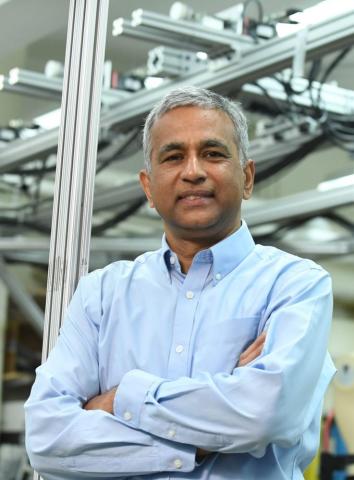event
IRIM/GCMR Robotics Seminar—Sunil Agarwal of Columbia University
Primary tabs
The Institute for Robotics and Intelligent Machines presents “Robotics to Characterize, Retrain, and Restore Human Movements” by Sunil Agrawal of Columbia University. This event is a joint seminar with the Georgia Center for Medical Robotics (GCMR). GCMR seminars are sponsored in part by Intuitive.
The seminar will be held in the Marcus Nanotechnology Building, Rooms 1116-1118, from 12:15-1:15 p.m. and is open to the public.
Abstract
Neural disorders and old age limit the ability of humans to perform activities of daily living. Robotics can be used to probe the human neuromuscular system and create new pathways to characterize, relearn, or restore functional movements. Dr. Agrawal’s group at Columbia University Robotics and Rehabilitation (ROAR) Laboratory has designed innovative technologies and robots for this purpose. These technologies have been tested on subjects in a variety of studies to understand human-cognitive and neuro-muscular responses. Human experiments have targeted patients with stroke, cerebral palsy, Parkinson’s disease, ALS, Vestibular disorders, elderly subjects, and others. The talk will provide an overview of some of these technologies and scientific studies performed with them.
Bio
Sunil K. Agrawal received a Ph.D. degree in Mechanical Engineering from Stanford University in 1990. He is currently a professor and the director of Robotics and Rehabilitation (ROAR) Laboratory at Columbia University, located in both the engineering and medical campuses of Columbia University.
Agrawal has published more than 500 journal and conference papers, three books, and 15 U.S. patents. He is a fellow of the ASME and AIMBE. His honors include an NSF Presidential Faculty Fellowship from the White House in 1994, a Bessel Prize from Germany in 2003, and a Humboldt U.S. Senior Scientist Award in 2007. He is a recipient of the 2016 Machine Design Award from ASME for “seminal contributions to design a robotic exoskeleton for gait training of stroke patients,” and the 2016 Mechanisms and Robotics Award from the ASME for “cumulative contributions and being an international leading figure in mechanical design and robotics”. He is a recipient of several Best Paper awards from ASME and IEEE sponsored robotics conferences.
Additionally, he has held international visiting positions at numerous institutions, including the Technical University of Stuttgart, Hanyang University in Korea, the University of Ulster in Northern Ireland, the Biorobotics Institute of SSSA in Pisa, and Peking University in China. He has successfully directed 30 Ph.D. student theses and currently supervises the research of ten Ph.D. students in the ROAR laboratory. He is the founding editor-in-chief of the journal Wearable Technologies from Cambridge University Press. He is the conference chair for IEEE BioRob2020 to be hosted in New York City.
Groups
Status
- Workflow status: Published
- Created by: Angela Ayers
- Created: 01/13/2020
- Modified By: Josie Giles
- Modified: 02/19/2020
Categories
Keywords
User Data
Target Audience

